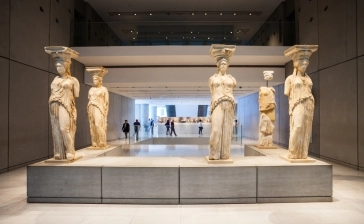Athens, the capital of Greece, is a city with a rich history and culture, home to over 3.7 million people. The city is known for its impressive ancient monuments, such as the Parthenon and the Acropolis, as well as its vibrant modern neighborhoods and lively nightlife.
However, like many cities around the world, Athens still faces significant challenges in terms of accessibility for people with physical disabilities, including those who use wheelchairs. While there have been some efforts to improve accessibility in Athens in recent decades, the city still has a long way to go to ensure that people with disabilities can move around the city easily and comfortably.
One of the biggest challenges for people with disabilities in Athens is the city's infrastructure, including streets and sidewalks. Many sidewalks are narrow and in poor condition, making it difficult for wheelchairs to access them. Additionally, many streets and sidewalks do not have access ramps, making it almost impossible for people in wheelchairs to move around independently. This means that they often have to rely on the help of others to get around the city.
Furthermore, many public and private buildings in Athens are not designed to be accessible for people with disabilities. Many buildings do not have ramps or elevators, making it difficult or impossible for people in wheelchairs to access them. Even in buildings that have ramps or elevators, they are often too narrow or not well-maintained, making it difficult for people in wheelchairs to use them effectively.
The lack of accessibility in Athens not only affects people in wheelchairs, but also other people with physical disabilities, such as those with mobility issues, balance problems, or difficulties walking. It can also be difficult for people with visual or hearing impairments to navigate the city due to the lack of accessible signage and adequate transportation services.
Despite these challenges, there are some initiatives in Athens that seek to improve accessibility for people with disabilities. The Greek government has adopted laws and regulations that require buildings and public spaces to be accessible for people with disabilities, although there is still much work to be done to ensure that these standards are met. There are also non-governmental organizations working to improve accessibility in Athens and other cities in Greece, pressuring governments and businesses to adopt more inclusive policies and practices.
Some interesting facts:
- Ancient history: Athens is known for being the birthplace of Western civilization and for having a rich history that dates back over 3,000 years. The city was the seat of ancient democracy and is home to some of the world's most important archaeological sites, such as the Acropolis of Athens, the Parthenon, the Ancient Agora, and the Temple of Olympian Zeus.
- Currency: The official currency of Greece is the euro, which is the same currency used in most European Union countries.
- Language: The official language of Athens is Modern Greek, although most residents of the city also speak English.
- Climate: Athens has a Mediterranean climate with hot, dry summers and mild, wet winters. The best time to visit Athens is in the spring and fall, when temperatures are pleasant and the city is not as crowded with tourists.
- Cuisine: Athens' cuisine is rich and varied, with a large number of traditional Greek dishes, such as moussaka, tzatziki, Greek salad, and souvlakis. It is also known for its strong, sweet coffee and local wine.
- Transportation: Public transportation in Athens includes metro, buses, trams, and trains. The metro is the fastest and most efficient way to get around the city, with three lines that cover much of Athens and its surroundings.
- Arts and culture: Athens is known for being a city of art and culture, with a large number of museums, art galleries, and theaters. The Acropolis Museum, the National Archaeological Museum, and the National Theatre of Greece are some of the highlights.
- Nightlife: Athens is known for having a lively nightlife, with a large number of bars, nightclubs, and restaurants that stay open until late at night.
Here is detailed information about tourism offices in Athens and accessibility options for people with reduced mobility:
Athens International Airport Tourism Office:
This tourism office is located in the arrivals terminal of Athens International Airport. It is open 7 days a week, from 7:30 am to 11:00 pm. The tourism office is equipped with access ramps for people with reduced mobility.
Address and contact:
- Attiki Odos, Spata Artemida 190 04, Greece
- Telephone: (+30) 210 35 30 000
- Website: https://www.aia.gr/home.aspx?lang=en-US
Syntagma Square Tourism Office:
This tourism office is located in Syntagma Square, near the Greek Parliament. The tourism office is open every day of the week from 9:00 am to 8:00 pm. The office has access ramps for people with reduced mobility.
In this office, visitors can obtain information about the main tourist attractions of the city, events and activities, as well as tourist services such as accommodation, transportation and restaurants. The office also provides free maps and brochures to help visitors plan their visit to Athens.
Address and contact:
- Syntagma Square, Athens, Greece
- Telephone: (+30) 210 331 0392
- Website: https://www.thisisathens.org/
Piraeus Port Tourism Office:
This tourism office is located in the port of Piraeus, one of the main ports in Greece. The office is open every day of the week from 8:00 am to 8:00 pm. The office has access ramps for people with reduced mobility.
The office is located in Terminal A, and from there, visitors can obtain information about the main tourist attractions of Athens, events and activities, as well as tourist services such as accommodation, transportation and restaurants. The office also provides free maps and brochures to help visitors plan their visit to the city.
Address and contact:
- Terminal A, Piraeus Port, Athens, Greece
- Telephone: +30 210 459 3140
- Website: https://www.thisisathens.org/
In summary, tourism offices in Athens are well-equipped to serve people with reduced mobility, and the city has significantly improved accessibility in recent years. However, there are still some limitations in some tourist sites, so it is recommended to research and plan in advance before visiting the city.
Airport:
Athens International Airport Eleftherios Venizelos (ATH) is the main airport in Greece and one of the busiest in southern Europe. It is a major hub for flights between Europe, Africa, and Asia. In recent years, the airport has made significant efforts to improve accessibility and offer services adapted to the needs of travelers with reduced mobility, including those who use wheelchairs.
Upon arrival at the airport, it is essential to request special assistance in advance from the airline you are traveling with. Airport staff are trained to offer assistance in the check-in process, security control, boarding and disembarking, as well as during transit between flights, and accessible waiting areas are available in all boarding areas. These areas are equipped with priority seating and adequate space for wheelchairs, and accessible toilets are available in all terminals, both in public areas and boarding areas. These toilets are marked with international pictograms and have support bars, enough space to maneuver, and sinks at the appropriate height.
Athens Airport is aware of the importance of having accessible facilities at all levels. Therefore, all areas of the airport are connected by adapted ramps and elevators, making it easy to move between different zones and levels of the terminals and providing direct access to the aircraft from the terminal without the need to climb stairs.
At Athens Airport, wheelchair users can also enjoy a wide variety of accessible shops, restaurants, and cafes. The aisles in the shops are wide enough to allow for wheelchair circulation, and the food areas have adapted tables.
Transportation from the airport to the city center:
There are several accessible transportation options for people with reduced mobility from the airport:
Metro:
Athens Metro line 3 connects the airport to the city center and other areas of the capital. Metro stations are equipped with elevators and ramps to facilitate access for wheelchair users. In addition, trains have reserved and marked spaces for wheelchairs.
Suburban Train (Proastiakos):
This train connects the airport to the Larissis train station in Athens, as well as other nearby cities. Suburban trains are also equipped with accessible and marked areas for wheelchairs, and stations have ramps and elevators.
Bus:
There are several bus lines that connect the airport to different areas of Athens and its surroundings. These buses have access ramps and reserved areas for wheelchair users. Some of the main accessible bus lines from the airport are X95 (to Syntagma Square), X96 (to the port of Piraeus), and X97 (to Elliniko Metro Station).
Taxi:
At the arrivals area of the airport, there is a taxi stand where accessible vehicles for people with reduced mobility can be found. These taxis are equipped with ramps or lifting platforms to facilitate access for wheelchairs and electric scooters. It is recommended to book in advance to ensure the availability of an accessible taxi. The taxi service from the airport to the city center has a standard price of €40, and if you travel between 01:00 and 05.00 am, the price is €56.
Here are the contact details for Official Taxi Greece:
City transportation:
Train:
The central train station in Athens, known as Larissis Station or Larissa Station, is an important transportation hub connecting Athens with other cities in Greece and international destinations. This station is served by both long-distance trains and the suburban train network (Proastiakos) and is located near the city center.
The station has made significant efforts to ensure accessibility for people with reduced mobility. Among the accessible facilities and services available at the station are:
- Ramps and elevators: The station has ramps and elevators that facilitate access to the different areas and levels of the station, including platforms, waiting rooms, and commercial areas.
- Adapted toilets: The Larissis train station has accessible toilets for people with reduced mobility, equipped with support bars and sufficient space to maneuver.
- Special assistance: Travelers with reduced mobility can request special assistance through the railway company with which they are traveling. This assistance may include help with accessing trains and the station, as well as information about itineraries and connections.
In addition, the Larissis train station offers a variety of services for travelers, including:
- Ticket offices and information desks: At the station, travelers can buy tickets, make reservations, and get information about train schedules and connections.
- Waiting rooms: There are waiting areas with seats available at the station, including designated spaces for people with reduced mobility.
- Shops and restaurants: The station has a variety of shops, cafes, and restaurants where travelers can buy food, drinks, and essential items.
- Luggage storage: A luggage storage service is offered, allowing travelers to securely store their luggage during their stay in Athens or while waiting for their train.
- Public transport connections: The Larissis station is well connected to Athens' public transport, including the metro (line 2) and urban buses.
Address and contact:
- Larissis Railway Station (Σταθμός Λαρίσης) K. Diligianni 2, Athina 104 39, Greece
- Phone: (+30) 210 5272000 (general information number for TRAINOSE)
- Website: https://www.trainose.gr/en/
Bus:
Athens has a network of urban buses and trolleybuses that provide public transport service throughout the city and its surroundings. The Athens Urban Transport Organization (OASA) is the entity responsible for managing public transport in the city, including buses.
Regarding accessibility, the Athens bus fleet has been incorporating low-floor and accessible vehicles for people with reduced mobility. These buses are adapted with the following features:
- Access ramps: Accessible buses have access ramps that facilitate the entry and exit of wheelchair and electric scooter users.
- Reserved spaces: These buses offer reserved and signposted areas for wheelchairs, with fastening systems to ensure safety during the journey.
- Priority seats: Buses also have priority seats for people with disabilities, older people, and pregnant women.
- Accessible stops: Many bus stops in Athens have been adapted to facilitate access for people with reduced mobility, including ramps and Braille signage.
Despite these advances, it is important to note that not all buses in Athens are adapted, and accessibility may vary depending on the route and the vehicle in service. For up-to-date information on accessible bus routes and schedules in Athens, I recommend visiting the OASA website (https://www.oasa.gr/) or contacting them for more information.
Taxi:
Adapted taxis for wheelchairs in Athens are a comfortable and accessible transportation option for people with reduced mobility. These taxis have adapted vehicles and trained drivers to provide assistance and facilitate access for wheelchair users.
General features of adapted taxis:
- Ramps or lifting platforms: Accessible taxis are equipped with ramps or lifting platforms to facilitate the entry and exit of wheelchair and electric scooter users.
- Space and fastening: These vehicles have enough space to accommodate at least one wheelchair, as well as fastening and anchoring systems to ensure safety during the journey.
- Trained drivers: Drivers of adapted taxis receive special training to assist users with reduced mobility and provide adequate and safe service.
Here are the contact details for Oficial Taxi Greece:
- Phone: (+30) 6947563984
- Email: info@officialtaxi.gr
- Website: https://www.officialtaxi.gr/
Tram:
The tram in Athens is another accessible public transportation option for people with reduced mobility. The tram network in Athens connects the city center with the southern suburbs and the coast. Currently, there are three tram lines in operation: T3 (from the city center to Piraeus), T4 (from the city center to Glyfada), and T5 (from the city center to Voula).
Accessibility on the Athens tram includes the following features:
- Low-floor vehicles: Trams in Athens have a low-floor design that facilitates access for wheelchair users, electric scooters, and baby strollers.
- Reserved spaces: Trams have reserved and signposted areas for wheelchairs, ensuring that people with reduced mobility can travel comfortably.
- Accessible stops: Tram stops in Athens are designed to be accessible, with ramps and non-slip surfaces that facilitate access for users with reduced mobility. In addition, some stops have Braille information and audible signage for people with visual and hearing impairments.
- Visual and auditory announcements: Trams in Athens are equipped with visual and auditory announcement systems that provide information about upcoming stops and other relevant information for passengers.
The Athens tram is a convenient and accessible public transportation option for people with reduced mobility.
Plaka neighborhood:
The Plaka neighborhood in Athens is one of the most picturesque and historic areas in the city. With its cobblestone streets, souvenir shops, restaurants, and old neoclassical houses, it is a popular destination for tourists visiting the Greek capital. However, due to its age and the topography of the area, it can be a bit challenging for wheelchair users.
Firstly, it's important to note that the streets in Plaka are narrow and steep, which can make access difficult for people with disabilities. However, there are some places that are wheelchair accessible and worth visiting.
One of these places is Monastiraki Square, located in the heart of Plaka. The square is spacious and paved, making it easy to access in a wheelchair. Additionally, there are several cafes and restaurants that have ramps and offer food and drink options for people with disabilities.
Another place to visit in Plaka is the Acropolis Museum. The museum has elevators and ramps to ensure accessibility for people with disabilities. It also has interesting and well-organized exhibits that allow visitors to learn about the history of the Acropolis and its monuments.
Another point of interest in Plaka is the Agios Eleftherios church. The church is an impressive building with a rich history dating back to the 12th century. Although the entrance may be a bit narrow, the interior of the church is spacious and well-lit, making wheelchair access easier.
In addition to these places, there are several restaurants and shops in Plaka that have ramps and are wheelchair accessible. It's recommended to research and plan in advance to ensure a safe and comfortable experience in the neighborhood.
It's important to note that the streets in Plaka are narrow and cobblestone, which can make access difficult for people with disabilities. However, some solutions exist to facilitate wheelchair accessibility. Some shops and restaurants have ramps and are designed to allow wheelchair access. Additionally, some hotels and apartments have adapted rooms for people with disabilities.
It's recommended to research and plan in advance to ensure a safe and comfortable experience in Plaka. It's also possible to hire a personal assistant or tour guide who can provide assistance and guidance during the visit.
In summary, Plaka is a beautiful and historic place in Athens. Although it can be challenging for people with disabilities, there are some places that are wheelchair accessible and worth visiting. With a bit of research and planning, one can enjoy a unique and satisfying experience in one of the city's most iconic neighborhoods.
Anafiotika Neighborhood:
Anafiotika is a picturesque and charming corner of Athens, located on the northern slope of the Acropolis hill. This historic and beautiful place attracts thousands of visitors every year who are drawn to its traditional architecture, narrow streets, and relaxed atmosphere. However, is this neighborhood accessible to those who rely on a wheelchair? Through this tour, we will explain how it is possible to enjoy Anafiotika in a wheelchair and what measures have been taken to make it accessible to everyone.
History of Anafiotika
Before delving into the accessibility of the neighborhood, it is important to know a little about its history. Anafiotika is a unique area within Athens, built in the 19th century by artisans and workers from the island of Anafi, who settled on the slope of the Acropolis. Its white two-story houses with red-tiled roofs, mixed with the local vegetation, give this neighborhood a special charm that sets it apart from the rest of the city.
At first glance, Anafiotika may seem complicated for those in wheelchairs, as its narrow cobbled streets and numerous stairs can make mobility difficult. However, in recent years, local authorities have worked hard to improve accessibility in the area, implementing a series of measures to facilitate access for all visitors.
- Paving of streets and paths: Anti-slip tiles have been installed on some of the busiest streets in the neighborhood, allowing for safer and more comfortable movement for people in wheelchairs. These accessible paths are clearly marked with universal accessibility symbols.
- Ramp at the Church of St. George in Anafiotika: The Church of St. George is an important landmark in the neighborhood and a place of interest for visitors. To ensure its accessibility, a ramp has been installed at the main entrance, allowing wheelchair access.
- Tactile signage: To assist people with visual impairments, tactile signage has been implemented at various points in the neighborhood, facilitating orientation and access to different areas.
- Accessible viewpoints: Some of Anafiotika's most popular viewpoints now have paved areas and railings to ensure the safety of all visitors, including those in wheelchairs.
- Adapted transportation: The nearest metro station to Anafiotika, the Acropolis station, has elevators and ramps to facilitate access for people in wheelchairs.
Finally, we recommend visiting some of the local art and craft workshops, as Anafiotika is known for its local artists and artisans. You can visit their workshops and stores to discover unique artwork, ceramics, jewelry, and other handmade products. Some stores and workshops may have limited accessibility, but don't hesitate to ask the owner if they can facilitate access.
In conclusion, a visit to this neighborhood will reveal a different and incredible Athens.
Restaurant Ta Karamanlidika tou Fani : https://karamanlidika.gr/
Greece This restaurant is famous for its local sausages and cheeses, as well as for its traditional Greek dishes. The place is wheelchair accessible and has a cozy atmosphere.
Its opening hours are Monday to Saturday from 08:00 to 23:00.
Address and contact:
- Sokratous 1 and Evripidou, GR 10552, Athens.
- Phone: (+30) 210 3254 184.
Restaurant Dionisos Zonar's: https://dionysoszonars.gr/
This restaurant offers an impressive view of the Acropolis and a wide variety of Greek and Mediterranean dishes. It has ramps and suitable spaces for wheelchair access.
Address and contact:
- Rovertou Galli 43, Athens 117 42, Greece
- Phones: (+30) 210 9231936 or (+30) 210 9233182
- Email: info@dionysoszonars.gr
Restaurant Avocado: https://www.avocadoathens.com/
This restaurant is located in the heart of Athens, and offers vegan and vegetarian food and fresh, delicious and healthy drinks for total well-being, inspired by the "slow food" movement. Avocado offers exclusively seasonal, traditional products combined in recipes made with love. Its opening hours are Monday to Saturday from 12:00 to 22:00 and Sunday from 12:00 to 17:00.
The place is accessible to people with mobility problems.
Address and contact:
- Nikis 30, Syntagma, 105 57 Athens, Greece
- Phone: (+30) 210-323 78 78
- Email: happy@avocadoathens.com










